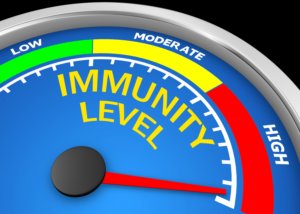 Scientists have discovered traces of antibiotic-resistant super bacteria (NDM-1) in the soil of Svalbard. This archipelago is located in the arctic ocean between the North Pole and Norway, several thousand kilometers from India where the bacteria was originally discovered. This is described in a study that is published in the science journal, Environment International. Bacteria with the resistance gene NDM-1 have now spread to a number of other countries and many people have lost their lives to them. Humans are also challenged by other antibiotic-resistant bacteria, and the British health authorities consider this to be a larger threat to humans than climate change. But what causes these bacteria to develop resistance? And what vitamins and minerals are particularly important for bolstering the immune system? After all, our immune defense is our only way of protecting ourselves if antibiotics fail to work.
Scientists have discovered traces of antibiotic-resistant super bacteria (NDM-1) in the soil of Svalbard. This archipelago is located in the arctic ocean between the North Pole and Norway, several thousand kilometers from India where the bacteria was originally discovered. This is described in a study that is published in the science journal, Environment International. Bacteria with the resistance gene NDM-1 have now spread to a number of other countries and many people have lost their lives to them. Humans are also challenged by other antibiotic-resistant bacteria, and the British health authorities consider this to be a larger threat to humans than climate change. But what causes these bacteria to develop resistance? And what vitamins and minerals are particularly important for bolstering the immune system? After all, our immune defense is our only way of protecting ourselves if antibiotics fail to work.
 Swedish scientists wrote medical history when they discovered that supplementation with Q10 and selenium could halve a person's risk of dying from cardiovascular disease. Now, a 10-year follow-up of the Swedish study shows that taking these two supplements even has a notable long-term effect on cardiac function and lifespan.
Swedish scientists wrote medical history when they discovered that supplementation with Q10 and selenium could halve a person's risk of dying from cardiovascular disease. Now, a 10-year follow-up of the Swedish study shows that taking these two supplements even has a notable long-term effect on cardiac function and lifespan.
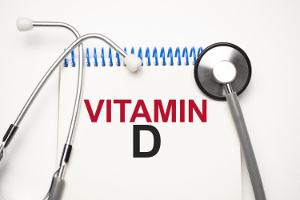 There is worldwide focus on finding better ways to prevent and treat COVID-19 because of the limited effect of vaccines. It is important to understand why the infections are harmless in most cases and why only a small number of people are affected by ARDS (acute respiratory distress syndrome), which is complicated and involves hyperinflammation. What represents the real problem here and what makes these infections life-threatening is a derailed and overactive immune defense. Multiple studies have already demonstrated that lack of vitamin D increases the risk of being infected with COVID-19 ending up in intensive care, and the studies also show that vitamin D supplements have a therapeutic potential. In a new review article that is published in Clinical and Molecular Allergy, researchers look closer at the synergy between vitamin D, magnesium, and zinc in relation to their ability to regulate the immune system and as potential therapeutic agents. It is also vital to have enough selenium, a nutrient that many people lack.
There is worldwide focus on finding better ways to prevent and treat COVID-19 because of the limited effect of vaccines. It is important to understand why the infections are harmless in most cases and why only a small number of people are affected by ARDS (acute respiratory distress syndrome), which is complicated and involves hyperinflammation. What represents the real problem here and what makes these infections life-threatening is a derailed and overactive immune defense. Multiple studies have already demonstrated that lack of vitamin D increases the risk of being infected with COVID-19 ending up in intensive care, and the studies also show that vitamin D supplements have a therapeutic potential. In a new review article that is published in Clinical and Molecular Allergy, researchers look closer at the synergy between vitamin D, magnesium, and zinc in relation to their ability to regulate the immune system and as potential therapeutic agents. It is also vital to have enough selenium, a nutrient that many people lack.
- and these compounds increase the need for iodine
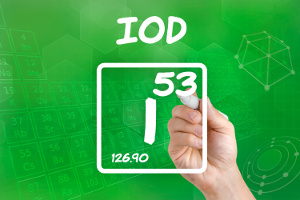 We humans are exposed to a host of toxic fluoride compounds from food packaging, cookie sheets, rain clothes, impregnation agents, tap water, toothpaste etc. Effective July 1., 2020, cardboard, parchment paper, and cookie sheets that contain fluoride compounds are banned in Denmark. Fluoride poisoning increases the risk of various thyroid disorders, breast cancer, kidney diseases, ADHD, and fetal damage. At the same time, it increases the need for iodine. In fact, the symptoms of fluoride poisoning are often the same as the those seen with iodine deficiency. Read more about how to avoid fluoride compounds in the environment and how to make sure to get enough iodine.
We humans are exposed to a host of toxic fluoride compounds from food packaging, cookie sheets, rain clothes, impregnation agents, tap water, toothpaste etc. Effective July 1., 2020, cardboard, parchment paper, and cookie sheets that contain fluoride compounds are banned in Denmark. Fluoride poisoning increases the risk of various thyroid disorders, breast cancer, kidney diseases, ADHD, and fetal damage. At the same time, it increases the need for iodine. In fact, the symptoms of fluoride poisoning are often the same as the those seen with iodine deficiency. Read more about how to avoid fluoride compounds in the environment and how to make sure to get enough iodine.
 Fish contains vitamin D, omega-3 fatty acids, selenium, and iodine, all of which are important for the fetus’ brain and development. However, fish also contains mercury and that discourages many pregnant women from eating fish. According to a new study that is published in NeuroToxicology, eating fish during pregnancy is actually not harmful at all, on the contrary, and the scientists behind the study argue that the precautionary guidelines need to be revised. Apparently, the selenium content in fish and seafood determines if mercury is dangerous or not.
Fish contains vitamin D, omega-3 fatty acids, selenium, and iodine, all of which are important for the fetus’ brain and development. However, fish also contains mercury and that discourages many pregnant women from eating fish. According to a new study that is published in NeuroToxicology, eating fish during pregnancy is actually not harmful at all, on the contrary, and the scientists behind the study argue that the precautionary guidelines need to be revised. Apparently, the selenium content in fish and seafood determines if mercury is dangerous or not.
 Selenium is an essential trace element that supports a host of different proteins and antioxidants that are important for pregnancy. According to a new Norwegian population study that is published in the science journal Nutrients, lack of selenium during pregnancy may stunt the growth of the fetus and result in low birth weight. This may have consequences for the child’s growth, cognitive skills, and health. Selenium deficiencies are rather common in Norway and the rest of Europe and that is a problem.
Selenium is an essential trace element that supports a host of different proteins and antioxidants that are important for pregnancy. According to a new Norwegian population study that is published in the science journal Nutrients, lack of selenium during pregnancy may stunt the growth of the fetus and result in low birth weight. This may have consequences for the child’s growth, cognitive skills, and health. Selenium deficiencies are rather common in Norway and the rest of Europe and that is a problem.
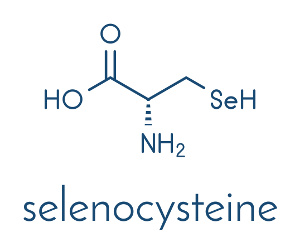 Selenium is a trace element that supports well over 25 different selenoproteins, which are important for our energy turnover, blood sugar balance, metabolism, cell protection, and a host of other essential functions. A group of scientists from Rutgers University in New Jersey, USA, has just uncovered the mechanisms involved in getting selenium into the “engine room” of the cells, from where it is metabolized into the different selenoproteins. According to the scientists, this new insight into the metabolism of selenium may lead to new therapies that can treat a variety of diseases such as diabetes, metabolic disorders, and cancer.
Selenium is a trace element that supports well over 25 different selenoproteins, which are important for our energy turnover, blood sugar balance, metabolism, cell protection, and a host of other essential functions. A group of scientists from Rutgers University in New Jersey, USA, has just uncovered the mechanisms involved in getting selenium into the “engine room” of the cells, from where it is metabolized into the different selenoproteins. According to the scientists, this new insight into the metabolism of selenium may lead to new therapies that can treat a variety of diseases such as diabetes, metabolic disorders, and cancer.
- and supplements can often help
 Depression is on the rise. The problem is often caused by inflammation in the brain. The British neuro-immunologist, Edvard Bullmore, has published the thought-provoking book called The Inflamed Mind, in which he describes the link between root canal treatment and depression, among other things. David Perlmutter, a neurologist, has written the book, Grain Brain, where he describes how gluten combined with carbohydrate overload also can cause inflammation in the brain. Depression, in other words, may occur when the blood-brain barrier is not as impermeable as assumed, and when the cytokines of the immune defense are able to cause undesirable brain inflammation. Numerous studies have shown that fish oil, vitamin D, magnesium, zinc, and selenium can improve a person’s mood by counteracting inflammation in the brain and other sites, and there is often a connection. It requires therapeutic doses, however, and it is vital that the supplements have good bioavailability, so the active substances reach the cells.
Depression is on the rise. The problem is often caused by inflammation in the brain. The British neuro-immunologist, Edvard Bullmore, has published the thought-provoking book called The Inflamed Mind, in which he describes the link between root canal treatment and depression, among other things. David Perlmutter, a neurologist, has written the book, Grain Brain, where he describes how gluten combined with carbohydrate overload also can cause inflammation in the brain. Depression, in other words, may occur when the blood-brain barrier is not as impermeable as assumed, and when the cytokines of the immune defense are able to cause undesirable brain inflammation. Numerous studies have shown that fish oil, vitamin D, magnesium, zinc, and selenium can improve a person’s mood by counteracting inflammation in the brain and other sites, and there is often a connection. It requires therapeutic doses, however, and it is vital that the supplements have good bioavailability, so the active substances reach the cells.
 During the winter period, many people catch a cold or are bed-ridden with a bout of the flu. They may consider this to be perfectly natural, but it is actually a sign of a weakened immune defense, and that makes them susceptible to contamination. What matters is to make sure to get plenty of vitamin D, vitamin C, selenium, and zinc, all of which are nutrients that have different functions in the immune system. Some nutrients are also needed in larger quantities to tackle a beginning infection, and it is important to act quickly in order to nip the infection in the bud.
During the winter period, many people catch a cold or are bed-ridden with a bout of the flu. They may consider this to be perfectly natural, but it is actually a sign of a weakened immune defense, and that makes them susceptible to contamination. What matters is to make sure to get plenty of vitamin D, vitamin C, selenium, and zinc, all of which are nutrients that have different functions in the immune system. Some nutrients are also needed in larger quantities to tackle a beginning infection, and it is important to act quickly in order to nip the infection in the bud.
In fact, it is vital for us to be nutritionally bolstered during the winter period, where otherwise harmless virus infections can lead to complications such as herpes, bronchitis, and pneumonia, if the immune system is unable to work full throttle.
- and selenium deficiencies are widespread
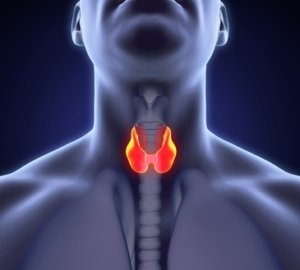 An estimated 500,000 Danes suffer from some kind of thyroid disorder, the most common of which is Hashimoto’s disease, which slows down your metabolism. The formation and activation of thyroid hormones depend on iodine and selenium, and it is essential that the two nutrients are properly balanced. Having too little or too much iodine increases your risk of Hashimoto’s disease, and the same is the case with selenium, a nutrient that many people lack.
An estimated 500,000 Danes suffer from some kind of thyroid disorder, the most common of which is Hashimoto’s disease, which slows down your metabolism. The formation and activation of thyroid hormones depend on iodine and selenium, and it is essential that the two nutrients are properly balanced. Having too little or too much iodine increases your risk of Hashimoto’s disease, and the same is the case with selenium, a nutrient that many people lack.
Some of the problems that are seen in people with slow metabolism are extreme fatigue, weight gain, constipation, cold sensitivity, swollen neck, and dry skin. The symptoms can vary, however, and many people still have not been given the proper diagnosis. Medical therapy with thyroid hormones will not necessarily solve the problem. In fact, as many as 20 percent of patients actually feel worse, although their blood tests appear to be normal. It is therefore important to focus more in the role of iodine and selenium in the metabolism.
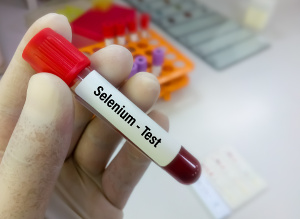 Both physical traumas and critical illnesses are associated with inflammation and oxidative stress where free radicals can cause potentially life-threatening damage to cells and tissues. Traumas are estimated to be the cause of one in ten deaths. New research suggests that early intervention with selenium may shorten the hospital stay including the days spent in intensive care and reduce total mortality. This was shown in a study published in Frontiers in Nutrition where the researchers looked closer at selenium’s unique antioxidant properties and anti-inflammatory effect.
Both physical traumas and critical illnesses are associated with inflammation and oxidative stress where free radicals can cause potentially life-threatening damage to cells and tissues. Traumas are estimated to be the cause of one in ten deaths. New research suggests that early intervention with selenium may shorten the hospital stay including the days spent in intensive care and reduce total mortality. This was shown in a study published in Frontiers in Nutrition where the researchers looked closer at selenium’s unique antioxidant properties and anti-inflammatory effect.
 Plant-based vegan diets have become increasingly popular among young adults and they even introduce these diets to their children. It is common knowledge that vegan diets lack vitamin B12, which is why many vegans take a supplement. However, a sizeable number of vegans also lack iodine, iron, zinc, and selenium. Most studies have looked at adults but it appears that children on vegan diets also risk metabolic changes, and they have lower blood levels of vitamins A and D compared with children on normal diets. This was demonstrated in a new study that is published in the esteemed international science magazine, EMBO Molecular Medicine.
Plant-based vegan diets have become increasingly popular among young adults and they even introduce these diets to their children. It is common knowledge that vegan diets lack vitamin B12, which is why many vegans take a supplement. However, a sizeable number of vegans also lack iodine, iron, zinc, and selenium. Most studies have looked at adults but it appears that children on vegan diets also risk metabolic changes, and they have lower blood levels of vitamins A and D compared with children on normal diets. This was demonstrated in a new study that is published in the esteemed international science magazine, EMBO Molecular Medicine.
– and that may harm your fertility, metabolism, nervous system, and the growth of your child
 Everyone is talking about the climate, and meat has lost popularity for a number of reasons. But let us keep our heads clear on the facts. There is a big difference between CO2 emissions, animal welfare, and the quality or quantity of meat on one hand and the nutritional aspects of meat on the other hand. Humans have been eating meat (including fish) for around two million years, and animal food sources have contributed to our large brains and development in general. Nonetheless, more and more people choose to become vegetarians, and the trend is especially popular among women. This gives rise for concern, as lack of protein, vitamin D, vitamin B12, iodine, selenium, iron, zinc and omega-3 fatty acids not only impairs fertility but even increases the risk of metabolic disorders, serious growth disturbances in children and a lot more. Some of these symptoms are insidious and therefore difficult to link to the diet.
Everyone is talking about the climate, and meat has lost popularity for a number of reasons. But let us keep our heads clear on the facts. There is a big difference between CO2 emissions, animal welfare, and the quality or quantity of meat on one hand and the nutritional aspects of meat on the other hand. Humans have been eating meat (including fish) for around two million years, and animal food sources have contributed to our large brains and development in general. Nonetheless, more and more people choose to become vegetarians, and the trend is especially popular among women. This gives rise for concern, as lack of protein, vitamin D, vitamin B12, iodine, selenium, iron, zinc and omega-3 fatty acids not only impairs fertility but even increases the risk of metabolic disorders, serious growth disturbances in children and a lot more. Some of these symptoms are insidious and therefore difficult to link to the diet.
 More and more people in the Western world shift to a plant-based diet but may find themselves challenged when it comes to getting enough of certain essential nutrients. A new German study shows that most vegetarians and vegans get enough vitamin B12, provided they take supplements. However, many lack iodine and iron. Also, plant-based diet fails to deliver enough vitamin D, and many lack selenium due to the nutrient-depleted farmland. A lot of deficiency diseases are insidious, which makes it difficult to link them to the diet. It is therefore a good idea for children and adults who are vegetarians or vegans to take relevant supplements.
More and more people in the Western world shift to a plant-based diet but may find themselves challenged when it comes to getting enough of certain essential nutrients. A new German study shows that most vegetarians and vegans get enough vitamin B12, provided they take supplements. However, many lack iodine and iron. Also, plant-based diet fails to deliver enough vitamin D, and many lack selenium due to the nutrient-depleted farmland. A lot of deficiency diseases are insidious, which makes it difficult to link them to the diet. It is therefore a good idea for children and adults who are vegetarians or vegans to take relevant supplements.
 Telomeres are protective caps at the end of our DNA strands. You can compare them to the small plastic aglets that prevent shoelaces from unraveling. For each time a cell divides, the telomeres become shorter. The length of telomeres conveniently indicates our biological age. Diet plays a role and according to a large population study, vitamin C intake is linked to telomere length. The same is the case with Q10 and selenium, according to Swedish research. Vitamin C, Q10, and selenium serve as unique antioxidants that protect the telomeres and the cells against damage caused by oxidative stress.
Telomeres are protective caps at the end of our DNA strands. You can compare them to the small plastic aglets that prevent shoelaces from unraveling. For each time a cell divides, the telomeres become shorter. The length of telomeres conveniently indicates our biological age. Diet plays a role and according to a large population study, vitamin C intake is linked to telomere length. The same is the case with Q10 and selenium, according to Swedish research. Vitamin C, Q10, and selenium serve as unique antioxidants that protect the telomeres and the cells against damage caused by oxidative stress.
 Lack of vitamin E increases your risk of fertility problems, atherosclerosis, blood clots, and Alzheimer's disease. The diet contains eight different forms of vitamin E. The vitamin is also available in supplement form, either as natural or synthetic vitamin E, and there are huge differences in terms of their effect.
Lack of vitamin E increases your risk of fertility problems, atherosclerosis, blood clots, and Alzheimer's disease. The diet contains eight different forms of vitamin E. The vitamin is also available in supplement form, either as natural or synthetic vitamin E, and there are huge differences in terms of their effect.
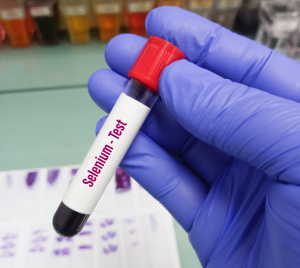 Selenium is important for our immune defense, thyroid gland, fertility, protection of cells, and other essential body functions that international science is very focused on. The recommended selenium intake for men and women has been increased by 50 percent. At the same time, the selenium content in the agricultural soil in the Nordic countries is rather low, which makes it challenging to get enough selenium from things like wholegrain, meat, dairy products, and eggs.
Selenium is important for our immune defense, thyroid gland, fertility, protection of cells, and other essential body functions that international science is very focused on. The recommended selenium intake for men and women has been increased by 50 percent. At the same time, the selenium content in the agricultural soil in the Nordic countries is rather low, which makes it challenging to get enough selenium from things like wholegrain, meat, dairy products, and eggs.
 It is vital to take good care of your eyes throughout life to maintain good vision. Our eyes need a number of different vitamins, minerals, and fatty acids that are important for cellular function and for protecting against oxidative stress. In this article, you can read more about vitamin A, vitamin C, vitamin E, B vitamins, zinc, selenium, omega-3 fatty acids, and Q10 and their vital role in maintaining healthy vision. We will also look at certain antioxidants that are found in eggs, salmon, spinach, broccoli, red bell pepper, and blueberries.
It is vital to take good care of your eyes throughout life to maintain good vision. Our eyes need a number of different vitamins, minerals, and fatty acids that are important for cellular function and for protecting against oxidative stress. In this article, you can read more about vitamin A, vitamin C, vitamin E, B vitamins, zinc, selenium, omega-3 fatty acids, and Q10 and their vital role in maintaining healthy vision. We will also look at certain antioxidants that are found in eggs, salmon, spinach, broccoli, red bell pepper, and blueberries.
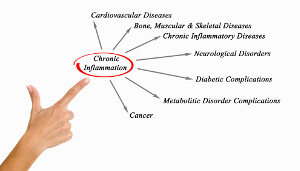 According to WHO, chronic inflammation is the leading cause of death worldwide. Although it is not something that can be felt as such, chronic inflammation sets the stage for a host of different diseases. In a new review article that is published in StatPearls, the authors look closer at why chronic inflammation is so dangerous and how a healthier lifestyle with vitamin D, selenium, magnesium, zinc, and fish oil can help fight the inflammation and prevent the many different diseases and early death that follow in its wake.
According to WHO, chronic inflammation is the leading cause of death worldwide. Although it is not something that can be felt as such, chronic inflammation sets the stage for a host of different diseases. In a new review article that is published in StatPearls, the authors look closer at why chronic inflammation is so dangerous and how a healthier lifestyle with vitamin D, selenium, magnesium, zinc, and fish oil can help fight the inflammation and prevent the many different diseases and early death that follow in its wake.
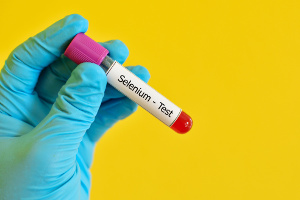 Newly diagnosed cancer patients often lack selenium. Not only does this contribute to the development of the disease, but it also worsens the prognosis. An estimated one billion people worldwide are selenium-deficient and there are many things that can explain it. High-doses selenium supplementation of cancer patients seems to have a positive effect on their health and quality of life during rehabilitation, and the best effect is seen when blood selenium levels remain high, according to a German study published in Nutrients.
Newly diagnosed cancer patients often lack selenium. Not only does this contribute to the development of the disease, but it also worsens the prognosis. An estimated one billion people worldwide are selenium-deficient and there are many things that can explain it. High-doses selenium supplementation of cancer patients seems to have a positive effect on their health and quality of life during rehabilitation, and the best effect is seen when blood selenium levels remain high, according to a German study published in Nutrients.
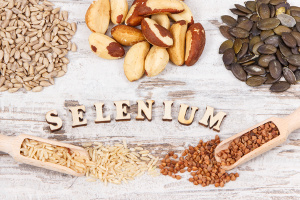 The trace element selenium has a vital yet overlooked role in ensuring a well-functioning immune system, and the widespread problems with selenium deficiency increase the risk of dying of COVID-19, according to a large German study that is published in the science journal Nutrients. The scientists therefore conclude that determining the patients’ blood selenium levels may provide vital diagnostic information. Also, the researchers conclude that it may be necessary to include selenium supplements in the treatment of COVID-19, especially with older people, diabetics, and those with chronic diseases that are at particular risk of life-threatening complications. The agricultural soil in Europe and other parts of the world contains relatively little selenium, which is why it is imperative to focus more on getting adequate amounts of this essential nutrient for the sake of preventing COVID-19 and other viral infections. It appears that the official recommendations – the so-called reference intake levels or RI – are not sufficient to meet the body’s actual requirements.
The trace element selenium has a vital yet overlooked role in ensuring a well-functioning immune system, and the widespread problems with selenium deficiency increase the risk of dying of COVID-19, according to a large German study that is published in the science journal Nutrients. The scientists therefore conclude that determining the patients’ blood selenium levels may provide vital diagnostic information. Also, the researchers conclude that it may be necessary to include selenium supplements in the treatment of COVID-19, especially with older people, diabetics, and those with chronic diseases that are at particular risk of life-threatening complications. The agricultural soil in Europe and other parts of the world contains relatively little selenium, which is why it is imperative to focus more on getting adequate amounts of this essential nutrient for the sake of preventing COVID-19 and other viral infections. It appears that the official recommendations – the so-called reference intake levels or RI – are not sufficient to meet the body’s actual requirements.
 Decades of intensive farming have depleted the soil. As a result, crops lack up to 40% of their essential nutrients, according to a previously published study from University of Texas and a more recent one from Switzerland. Even if you stick to the official dietary guidelines, you may have difficulty with getting enough calcium, selenium, zinc, iron, vitamin B2, vitamin C, and other essential micronutrients that are required for good health.
Decades of intensive farming have depleted the soil. As a result, crops lack up to 40% of their essential nutrients, according to a previously published study from University of Texas and a more recent one from Switzerland. Even if you stick to the official dietary guidelines, you may have difficulty with getting enough calcium, selenium, zinc, iron, vitamin B2, vitamin C, and other essential micronutrients that are required for good health.
 Scientists have discovered traces of antibiotic-resistant super bacteria (NDM-1) in the soil of Svalbard. This archipelago is located in the arctic ocean between the North Pole and Norway, several thousand kilometers from India where the bacteria was originally discovered. This is described in a study that is published in the science journal, Environment International. Bacteria with the resistance gene NDM-1 have now spread to a number of other countries and many people have lost their lives to them. Humans are also challenged by other antibiotic-resistant bacteria, and the British health authorities consider this to be a larger threat to humans than climate change. But what causes these bacteria to develop resistance? And what vitamins and minerals are particularly important for bolstering the immune system? After all, our immune defense is our only way of protecting ourselves if antibiotics fail to work.
Scientists have discovered traces of antibiotic-resistant super bacteria (NDM-1) in the soil of Svalbard. This archipelago is located in the arctic ocean between the North Pole and Norway, several thousand kilometers from India where the bacteria was originally discovered. This is described in a study that is published in the science journal, Environment International. Bacteria with the resistance gene NDM-1 have now spread to a number of other countries and many people have lost their lives to them. Humans are also challenged by other antibiotic-resistant bacteria, and the British health authorities consider this to be a larger threat to humans than climate change. But what causes these bacteria to develop resistance? And what vitamins and minerals are particularly important for bolstering the immune system? After all, our immune defense is our only way of protecting ourselves if antibiotics fail to work.







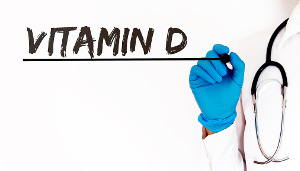



 Swedish scientists wrote medical history when they discovered that supplementation with Q10 and selenium could halve a person's risk of dying from cardiovascular disease. Now, a 10-year follow-up of the Swedish study shows that taking these two supplements even has a notable long-term effect on cardiac function and lifespan.
Swedish scientists wrote medical history when they discovered that supplementation with Q10 and selenium could halve a person's risk of dying from cardiovascular disease. Now, a 10-year follow-up of the Swedish study shows that taking these two supplements even has a notable long-term effect on cardiac function and lifespan. There is worldwide focus on finding better ways to prevent and treat COVID-19 because of the limited effect of vaccines. It is important to understand why the infections are harmless in most cases and why only a small number of people are affected by ARDS (acute respiratory distress syndrome), which is complicated and involves hyperinflammation. What represents the real problem here and what makes these infections life-threatening is a derailed and overactive immune defense. Multiple studies have already demonstrated that lack of vitamin D increases the risk of being infected with COVID-19 ending up in intensive care, and the studies also show that vitamin D supplements have a therapeutic potential. In a new review article that is published in Clinical and Molecular Allergy, researchers look closer at the synergy between vitamin D, magnesium, and zinc in relation to their ability to regulate the immune system and as potential therapeutic agents. It is also vital to have enough selenium, a nutrient that many people lack.
There is worldwide focus on finding better ways to prevent and treat COVID-19 because of the limited effect of vaccines. It is important to understand why the infections are harmless in most cases and why only a small number of people are affected by ARDS (acute respiratory distress syndrome), which is complicated and involves hyperinflammation. What represents the real problem here and what makes these infections life-threatening is a derailed and overactive immune defense. Multiple studies have already demonstrated that lack of vitamin D increases the risk of being infected with COVID-19 ending up in intensive care, and the studies also show that vitamin D supplements have a therapeutic potential. In a new review article that is published in Clinical and Molecular Allergy, researchers look closer at the synergy between vitamin D, magnesium, and zinc in relation to their ability to regulate the immune system and as potential therapeutic agents. It is also vital to have enough selenium, a nutrient that many people lack. We humans are exposed to a host of toxic fluoride compounds from food packaging, cookie sheets, rain clothes, impregnation agents, tap water, toothpaste etc. Effective July 1., 2020, cardboard, parchment paper, and cookie sheets that contain fluoride compounds are banned in Denmark. Fluoride poisoning increases the risk of various thyroid disorders, breast cancer, kidney diseases, ADHD, and fetal damage. At the same time, it increases the need for
We humans are exposed to a host of toxic fluoride compounds from food packaging, cookie sheets, rain clothes, impregnation agents, tap water, toothpaste etc. Effective July 1., 2020, cardboard, parchment paper, and cookie sheets that contain fluoride compounds are banned in Denmark. Fluoride poisoning increases the risk of various thyroid disorders, breast cancer, kidney diseases, ADHD, and fetal damage. At the same time, it increases the need for  Fish contains vitamin D, omega-3 fatty acids, selenium, and iodine, all of which are important for the fetus’ brain and development. However, fish also contains mercury and that discourages many pregnant women from eating fish. According to a new study that is published in NeuroToxicology, eating fish during pregnancy is actually not harmful at all, on the contrary, and the scientists behind the study argue that the precautionary guidelines need to be revised. Apparently, the selenium content in fish and seafood determines if mercury is dangerous or not.
Fish contains vitamin D, omega-3 fatty acids, selenium, and iodine, all of which are important for the fetus’ brain and development. However, fish also contains mercury and that discourages many pregnant women from eating fish. According to a new study that is published in NeuroToxicology, eating fish during pregnancy is actually not harmful at all, on the contrary, and the scientists behind the study argue that the precautionary guidelines need to be revised. Apparently, the selenium content in fish and seafood determines if mercury is dangerous or not.

 Depression is on the rise. The problem is often caused by inflammation in the brain. The British neuro-immunologist, Edvard Bullmore, has published the thought-provoking book called The Inflamed Mind, in which he describes the link between root canal treatment and depression, among other things. David Perlmutter, a neurologist, has written the book, Grain Brain, where he describes how gluten combined with carbohydrate overload also can cause inflammation in the brain. Depression, in other words, may occur when the blood-brain barrier is not as impermeable as assumed, and when the cytokines of the immune defense are able to cause undesirable brain inflammation. Numerous studies have shown that fish oil, vitamin D, magnesium, zinc, and selenium can improve a person’s mood by counteracting inflammation in the brain and other sites, and there is often a connection. It requires therapeutic doses, however, and it is vital that the supplements have good bioavailability, so the active substances reach the cells.
Depression is on the rise. The problem is often caused by inflammation in the brain. The British neuro-immunologist, Edvard Bullmore, has published the thought-provoking book called The Inflamed Mind, in which he describes the link between root canal treatment and depression, among other things. David Perlmutter, a neurologist, has written the book, Grain Brain, where he describes how gluten combined with carbohydrate overload also can cause inflammation in the brain. Depression, in other words, may occur when the blood-brain barrier is not as impermeable as assumed, and when the cytokines of the immune defense are able to cause undesirable brain inflammation. Numerous studies have shown that fish oil, vitamin D, magnesium, zinc, and selenium can improve a person’s mood by counteracting inflammation in the brain and other sites, and there is often a connection. It requires therapeutic doses, however, and it is vital that the supplements have good bioavailability, so the active substances reach the cells. During the winter period, many people catch a cold or are bed-ridden with a bout of the flu. They may consider this to be perfectly natural, but it is actually a sign of a weakened immune defense, and that makes them susceptible to contamination. What matters is to make sure to get plenty of vitamin D, vitamin C, selenium, and zinc, all of which are nutrients that have different functions in the immune system. Some nutrients are also needed in larger quantities to tackle a beginning infection, and it is important to act quickly in order to nip the infection in the bud.
During the winter period, many people catch a cold or are bed-ridden with a bout of the flu. They may consider this to be perfectly natural, but it is actually a sign of a weakened immune defense, and that makes them susceptible to contamination. What matters is to make sure to get plenty of vitamin D, vitamin C, selenium, and zinc, all of which are nutrients that have different functions in the immune system. Some nutrients are also needed in larger quantities to tackle a beginning infection, and it is important to act quickly in order to nip the infection in the bud. An estimated 500,000 Danes suffer from some kind of thyroid disorder, the most common of which is Hashimoto’s disease, which slows down your metabolism. The formation and activation of thyroid hormones depend on iodine and selenium, and it is essential that the two nutrients are properly balanced. Having too little or too much iodine increases your risk of Hashimoto’s disease, and the same is the case with selenium, a nutrient that many people lack.
An estimated 500,000 Danes suffer from some kind of thyroid disorder, the most common of which is Hashimoto’s disease, which slows down your metabolism. The formation and activation of thyroid hormones depend on iodine and selenium, and it is essential that the two nutrients are properly balanced. Having too little or too much iodine increases your risk of Hashimoto’s disease, and the same is the case with selenium, a nutrient that many people lack. Both physical traumas and critical illnesses are associated with inflammation and oxidative stress where free radicals can cause potentially life-threatening damage to cells and tissues. Traumas are estimated to be the cause of one in ten deaths. New research suggests that early intervention with
Both physical traumas and critical illnesses are associated with inflammation and oxidative stress where free radicals can cause potentially life-threatening damage to cells and tissues. Traumas are estimated to be the cause of one in ten deaths. New research suggests that early intervention with  Plant-based vegan diets have become increasingly popular among young adults and they even introduce these diets to their children. It is common knowledge that vegan diets lack vitamin B12, which is why many vegans take a supplement. However, a sizeable number of vegans also lack iodine, iron, zinc, and selenium. Most studies have looked at adults but it appears that children on vegan diets also risk metabolic changes, and they have lower blood levels of vitamins A and D compared with children on normal diets. This was demonstrated in a new study that is published in the esteemed international science magazine, EMBO Molecular Medicine.
Plant-based vegan diets have become increasingly popular among young adults and they even introduce these diets to their children. It is common knowledge that vegan diets lack vitamin B12, which is why many vegans take a supplement. However, a sizeable number of vegans also lack iodine, iron, zinc, and selenium. Most studies have looked at adults but it appears that children on vegan diets also risk metabolic changes, and they have lower blood levels of vitamins A and D compared with children on normal diets. This was demonstrated in a new study that is published in the esteemed international science magazine, EMBO Molecular Medicine. Everyone is talking about the climate, and meat has lost popularity for a number of reasons. But let us keep our heads clear on the facts. There is a big difference between CO2 emissions, animal welfare, and the quality or quantity of meat on one hand and the nutritional aspects of meat on the other hand. Humans have been eating meat (including fish) for around two million years, and animal food sources have contributed to our large brains and development in general. Nonetheless, more and more people choose to become vegetarians, and the trend is especially popular among women. This gives rise for concern, as lack of protein, vitamin D, vitamin B12, iodine, selenium, iron, zinc and omega-3 fatty acids not only impairs fertility but even increases the risk of metabolic disorders, serious growth disturbances in children and a lot more. Some of these symptoms are insidious and therefore difficult to link to the diet.
Everyone is talking about the climate, and meat has lost popularity for a number of reasons. But let us keep our heads clear on the facts. There is a big difference between CO2 emissions, animal welfare, and the quality or quantity of meat on one hand and the nutritional aspects of meat on the other hand. Humans have been eating meat (including fish) for around two million years, and animal food sources have contributed to our large brains and development in general. Nonetheless, more and more people choose to become vegetarians, and the trend is especially popular among women. This gives rise for concern, as lack of protein, vitamin D, vitamin B12, iodine, selenium, iron, zinc and omega-3 fatty acids not only impairs fertility but even increases the risk of metabolic disorders, serious growth disturbances in children and a lot more. Some of these symptoms are insidious and therefore difficult to link to the diet. More and more people in the Western world shift to a plant-based diet but may find themselves challenged when it comes to getting enough of certain essential nutrients. A new German study shows that most vegetarians and vegans get enough
More and more people in the Western world shift to a plant-based diet but may find themselves challenged when it comes to getting enough of certain essential nutrients. A new German study shows that most vegetarians and vegans get enough  Telomeres are protective caps at the end of our DNA strands. You can compare them to the small plastic aglets that prevent shoelaces from unraveling. For each time a cell divides, the telomeres become shorter. The length of telomeres conveniently indicates our biological age. Diet plays a role and according to a large population study, vitamin C intake is linked to telomere length. The same is the case with Q10 and selenium, according to Swedish research. Vitamin C, Q10, and selenium serve as unique antioxidants that protect the telomeres and the cells against damage caused by oxidative stress.
Telomeres are protective caps at the end of our DNA strands. You can compare them to the small plastic aglets that prevent shoelaces from unraveling. For each time a cell divides, the telomeres become shorter. The length of telomeres conveniently indicates our biological age. Diet plays a role and according to a large population study, vitamin C intake is linked to telomere length. The same is the case with Q10 and selenium, according to Swedish research. Vitamin C, Q10, and selenium serve as unique antioxidants that protect the telomeres and the cells against damage caused by oxidative stress. Lack of
Lack of 
 It is vital to take good care of your eyes throughout life to maintain good vision. Our eyes need a number of different vitamins, minerals, and fatty acids that are important for cellular function and for protecting against oxidative stress. In this article, you can read more about vitamin A, vitamin C, vitamin E, B vitamins, zinc, selenium, omega-3 fatty acids, and Q10 and their vital role in maintaining healthy vision. We will also look at certain antioxidants that are found in eggs, salmon, spinach, broccoli, red bell pepper, and blueberries.
It is vital to take good care of your eyes throughout life to maintain good vision. Our eyes need a number of different vitamins, minerals, and fatty acids that are important for cellular function and for protecting against oxidative stress. In this article, you can read more about vitamin A, vitamin C, vitamin E, B vitamins, zinc, selenium, omega-3 fatty acids, and Q10 and their vital role in maintaining healthy vision. We will also look at certain antioxidants that are found in eggs, salmon, spinach, broccoli, red bell pepper, and blueberries. According to WHO, chronic inflammation is the leading cause of death worldwide. Although it is not something that can be felt as such, chronic inflammation sets the stage for a host of different diseases. In a new review article that is published in StatPearls, the authors look closer at why chronic inflammation is so dangerous and how a healthier lifestyle with vitamin D, selenium, magnesium, zinc, and fish oil can help fight the inflammation and prevent the many different diseases and early death that follow in its wake.
According to WHO, chronic inflammation is the leading cause of death worldwide. Although it is not something that can be felt as such, chronic inflammation sets the stage for a host of different diseases. In a new review article that is published in StatPearls, the authors look closer at why chronic inflammation is so dangerous and how a healthier lifestyle with vitamin D, selenium, magnesium, zinc, and fish oil can help fight the inflammation and prevent the many different diseases and early death that follow in its wake.
 The trace element
The trace element  Decades of intensive farming have depleted the soil. As a result, crops lack up to 40% of their essential nutrients, according to a previously published study from University of Texas and a more recent one from Switzerland. Even if you stick to the official dietary guidelines, you may have difficulty with getting enough
Decades of intensive farming have depleted the soil. As a result, crops lack up to 40% of their essential nutrients, according to a previously published study from University of Texas and a more recent one from Switzerland. Even if you stick to the official dietary guidelines, you may have difficulty with getting enough "After about one week of taking the Q10 supplement I could feel a huge difference," says 23-year old Alan Piccini, who has been suffering from extreme fatigue and muscle aches ever since he was a child.
"After about one week of taking the Q10 supplement I could feel a huge difference," says 23-year old Alan Piccini, who has been suffering from extreme fatigue and muscle aches ever since he was a child. “Taking capsules with co-enzyme Q10 has freed me of the severe side effects of my cholesterol lowering medicine,” Mrs Franken explains.
“Taking capsules with co-enzyme Q10 has freed me of the severe side effects of my cholesterol lowering medicine,” Mrs Franken explains.